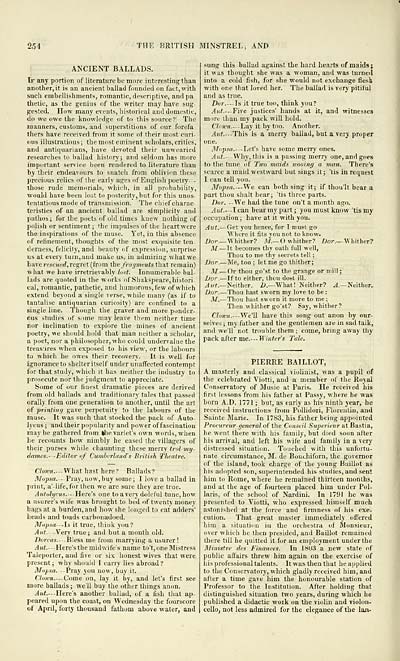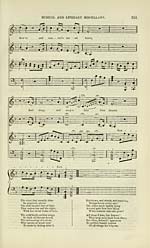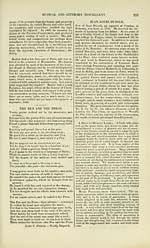Glen Collection of printed music > Printed music > British minstrel, and musical and literary miscellany
(262) Page 254
Download files
Complete book:
Individual page:
Thumbnail gallery: Grid view | List view

254
THE BRITISH MINSTREL; AND
ANCIENT BALLADS.
If any portion of literature be more interesting than
another, it is an ancient ballad founded on fact, with
such embellishments, romantic, descriptive, and pa
thetic, as the genius of the writer may have sug-
gested. How many events, historical and domestic,
do we owe the knowledge of to this source? The
manners, customs, and superstitions of our forefa
thers have received from it some of their most curi-
ous illustrations; the most eminent schcdars, critics,
and antiquarians, have devoted their unwearied
researches to ballad history; and seldom has more
important service been rendered to literature than
by their endeavours to snatch from oblivion these
precious relics of the early affes of English poetry- -
those rude memorials, which, in all probability,
would have been lost to posterity, but for this unos-
tentatious mode of transmission. The chief charac-
teristics of an ancient ballad are simplicity and
pathos ; for the poets of old times knew nothing of
polish or sentiment ; the impulses of the heart were
the inspirations of the muse. Yet, in this absence
of refinement, thoughts of the most exquisite ten-
derness, felicity, and beauty of expression, surprise
us at every turn, and make us, in admiring what we
have rescued^ regret (from the fragmoits that remain)
what we have irretrievably lost. Innumerable bal-
lads are quoted in the works of Shakspeare, histori-
cal, romantic, pathetic, and humorous, few of which
extend beyond a single verse, while many (as if to
tantalise antiquarian curiosity) are confined to a
single line. Though the graver and more ponder-
ous studies of some may leave them neither time
nor inclination to explore the mines of ancient
poetry, we should hold that man neither a scholar,
a poet, nor a philosopher, who could undervalue the
treasures when exposed to his view, or the labours
to which he owes their recovery. It is well for
ignorance to shelter itself under unaffected contempt
for that study, which it has neither the industry to
prosecute nor the judgment to appreciate.
Some of our finest dramatic pieces are derived
from old ballads and traditionary tales that passed
orally from one generation to another, until the art
of printiiiff gave per|)etuity to the labours of the
muse. It was such that stocked the pack of Auto-
lycus ; and their popularity and power of fascination
may be gathered from tlievarlet's own words, when
he recounts how nimbly he eased the villagers of
their purses while chaunting these merry trol-my-
dames Editor of Cumberland's British Theatre.
C/owii.--What hast here? Ballads?
3/opsa.---Pray,now,buy some; I love a ballad in
print, a'-life, for then we are sure they are true.
Aidulyciis.— Here's one to a very doleful tune, how
a usurer's wife was brought to bed of twenty money
bags at a burden, and how she longed to eat adders'
heads and toads carbonadoed.
Mopsa---ls it true, think you?
Aut.--YeTy true; and but a month old.
Dorcas — Bless me from marrying a usurer!
yl«<.---Here'sthemidwife's name to't, one Mistress
Taleporter, and five or six honest wives that were
present; why should I carry lies abroad?
Mopsa. --Pray you now, buy it.
CUnvn.— Come on, lay it by, and let's first see
more ballads ; we'll buy the other things anon.
.iJtti.— Here's another ballad, of a fish that ap-
peared upon the coast, on Wednesday the fourscore
of April, forty thousand fathom above water, and
sung this ballad against the hard hearts of maids ;
it was thought she was a woman, and was turned
into a cold fish, for she would not exchange tie-si
with one that loved her. The ballad is very pitiful
and as true.
Dor Is it true too, think you?
^H(.---Five justices' hands at it, and witnesses
more than my pack will hold.
C/(.)i-n.--Lay it by too. Another.
Aut.---This is a merry ballad, but a very proper
one.
fliopsa Let's have some merry ones.
Aut. ---Why, this is a passing merry one, and goes
to the tune oi' Tivo maids tvooiny a man. There's
scarce a maid westward but sings it; 'lis in request
I can tell you.
Mopsa.—'We can both sing it; if thou 'It bear a
part thou shalt hear; 'tis three parts.
Dor. --We had the tune on't a month ago.
yl«(.— lean bearmypart; you must know 'tis my
occupation; have at it with you.
Aut. — Oet you hence, for T must go
"Where it tits you not to know.
i)or.— Wliither? M.— O whither? Z»or.— '^N'hither?
M — It becomes thy oath full well,
Thou to me thy secrets tell ;
Dor. — We, too ; let me go thither;
M. — Or thou go'st to the grange or mill ;
Lor. — Tf to either, thou dost ill.
Avt. — Neither, D. — What! Neither? ^.—Neither.
Dor. — Thou hast sworn my love to be :
M. — Thou heist sworn it more to me ;
Then whither go'st? Say, whither?
Clomi.—'We'W have this song out anon by our-
selves ; my father and the gentlemen are in sad talk,
and we'll not trouble them ; come, bring away thy
pack after T[ie,--W'inter's Tale.
PIERRE BAILLOT,
A masterly and classical violinist, was a pupil of
the celebrated Viotti, and a member of the Royal
Conservatory of Music at Paris. He received his
first lessons from his father at Passy, where he was
born A.D. 1771 ; but, as early as his ninth year, he
received instructions from Pollidori, Florentin, and
Sainte Marie. In 1783, his father being appointed
Procureiir- general of the Conseil Sitpcrieitr at Bastia,
he went there with his family, hut died soon after
his arrival, and left his wife and family in a very
distressed situation. Touched with this unfortu-
nate circumstance, M. de Bouchiforn, the governor
of the island, took charge of the young Baillot as
his adopted son, superintended his studies, and sent
him t<i Rome, where he remained thirteen months,
and at the age of fourteen placed him under P(d-
laris, of the school of Nardini. In 1791 he was
presented to Viotti, who expressed himself much
astonished at the force and firmness of his exe-
cution. That great master immediately ofl'ered
him a situation in the orchestra of Monsieur,
over which he then presided, and Baillot remained
there till he quitted it for an employment under the
Mimstre des Finances. In 18U3 a new state of
public afi'airs threw him again on the exercise of
his professional talents. It was then that he applied
to the Conservatory, which gladly received him, and
after a time gave him the honourable station of
Professor to the Institution. After holding that
distinguished situation two years, during which he
published a didactic work on the violin and violon-
cello, not less admired for the elegance of the Ian-
THE BRITISH MINSTREL; AND
ANCIENT BALLADS.
If any portion of literature be more interesting than
another, it is an ancient ballad founded on fact, with
such embellishments, romantic, descriptive, and pa
thetic, as the genius of the writer may have sug-
gested. How many events, historical and domestic,
do we owe the knowledge of to this source? The
manners, customs, and superstitions of our forefa
thers have received from it some of their most curi-
ous illustrations; the most eminent schcdars, critics,
and antiquarians, have devoted their unwearied
researches to ballad history; and seldom has more
important service been rendered to literature than
by their endeavours to snatch from oblivion these
precious relics of the early affes of English poetry- -
those rude memorials, which, in all probability,
would have been lost to posterity, but for this unos-
tentatious mode of transmission. The chief charac-
teristics of an ancient ballad are simplicity and
pathos ; for the poets of old times knew nothing of
polish or sentiment ; the impulses of the heart were
the inspirations of the muse. Yet, in this absence
of refinement, thoughts of the most exquisite ten-
derness, felicity, and beauty of expression, surprise
us at every turn, and make us, in admiring what we
have rescued^ regret (from the fragmoits that remain)
what we have irretrievably lost. Innumerable bal-
lads are quoted in the works of Shakspeare, histori-
cal, romantic, pathetic, and humorous, few of which
extend beyond a single verse, while many (as if to
tantalise antiquarian curiosity) are confined to a
single line. Though the graver and more ponder-
ous studies of some may leave them neither time
nor inclination to explore the mines of ancient
poetry, we should hold that man neither a scholar,
a poet, nor a philosopher, who could undervalue the
treasures when exposed to his view, or the labours
to which he owes their recovery. It is well for
ignorance to shelter itself under unaffected contempt
for that study, which it has neither the industry to
prosecute nor the judgment to appreciate.
Some of our finest dramatic pieces are derived
from old ballads and traditionary tales that passed
orally from one generation to another, until the art
of printiiiff gave per|)etuity to the labours of the
muse. It was such that stocked the pack of Auto-
lycus ; and their popularity and power of fascination
may be gathered from tlievarlet's own words, when
he recounts how nimbly he eased the villagers of
their purses while chaunting these merry trol-my-
dames Editor of Cumberland's British Theatre.
C/owii.--What hast here? Ballads?
3/opsa.---Pray,now,buy some; I love a ballad in
print, a'-life, for then we are sure they are true.
Aidulyciis.— Here's one to a very doleful tune, how
a usurer's wife was brought to bed of twenty money
bags at a burden, and how she longed to eat adders'
heads and toads carbonadoed.
Mopsa---ls it true, think you?
Aut.--YeTy true; and but a month old.
Dorcas — Bless me from marrying a usurer!
yl«<.---Here'sthemidwife's name to't, one Mistress
Taleporter, and five or six honest wives that were
present; why should I carry lies abroad?
Mopsa. --Pray you now, buy it.
CUnvn.— Come on, lay it by, and let's first see
more ballads ; we'll buy the other things anon.
.iJtti.— Here's another ballad, of a fish that ap-
peared upon the coast, on Wednesday the fourscore
of April, forty thousand fathom above water, and
sung this ballad against the hard hearts of maids ;
it was thought she was a woman, and was turned
into a cold fish, for she would not exchange tie-si
with one that loved her. The ballad is very pitiful
and as true.
Dor Is it true too, think you?
^H(.---Five justices' hands at it, and witnesses
more than my pack will hold.
C/(.)i-n.--Lay it by too. Another.
Aut.---This is a merry ballad, but a very proper
one.
fliopsa Let's have some merry ones.
Aut. ---Why, this is a passing merry one, and goes
to the tune oi' Tivo maids tvooiny a man. There's
scarce a maid westward but sings it; 'lis in request
I can tell you.
Mopsa.—'We can both sing it; if thou 'It bear a
part thou shalt hear; 'tis three parts.
Dor. --We had the tune on't a month ago.
yl«(.— lean bearmypart; you must know 'tis my
occupation; have at it with you.
Aut. — Oet you hence, for T must go
"Where it tits you not to know.
i)or.— Wliither? M.— O whither? Z»or.— '^N'hither?
M — It becomes thy oath full well,
Thou to me thy secrets tell ;
Dor. — We, too ; let me go thither;
M. — Or thou go'st to the grange or mill ;
Lor. — Tf to either, thou dost ill.
Avt. — Neither, D. — What! Neither? ^.—Neither.
Dor. — Thou hast sworn my love to be :
M. — Thou heist sworn it more to me ;
Then whither go'st? Say, whither?
Clomi.—'We'W have this song out anon by our-
selves ; my father and the gentlemen are in sad talk,
and we'll not trouble them ; come, bring away thy
pack after T[ie,--W'inter's Tale.
PIERRE BAILLOT,
A masterly and classical violinist, was a pupil of
the celebrated Viotti, and a member of the Royal
Conservatory of Music at Paris. He received his
first lessons from his father at Passy, where he was
born A.D. 1771 ; but, as early as his ninth year, he
received instructions from Pollidori, Florentin, and
Sainte Marie. In 1783, his father being appointed
Procureiir- general of the Conseil Sitpcrieitr at Bastia,
he went there with his family, hut died soon after
his arrival, and left his wife and family in a very
distressed situation. Touched with this unfortu-
nate circumstance, M. de Bouchiforn, the governor
of the island, took charge of the young Baillot as
his adopted son, superintended his studies, and sent
him t<i Rome, where he remained thirteen months,
and at the age of fourteen placed him under P(d-
laris, of the school of Nardini. In 1791 he was
presented to Viotti, who expressed himself much
astonished at the force and firmness of his exe-
cution. That great master immediately ofl'ered
him a situation in the orchestra of Monsieur,
over which he then presided, and Baillot remained
there till he quitted it for an employment under the
Mimstre des Finances. In 18U3 a new state of
public afi'airs threw him again on the exercise of
his professional talents. It was then that he applied
to the Conservatory, which gladly received him, and
after a time gave him the honourable station of
Professor to the Institution. After holding that
distinguished situation two years, during which he
published a didactic work on the violin and violon-
cello, not less admired for the elegance of the Ian-
Set display mode to: Large image | Transcription
Images and transcriptions on this page, including medium image downloads, may be used under the Creative Commons Attribution 4.0 International Licence unless otherwise stated. ![]()
| Special collections of printed music > Glen Collection of printed music > Printed music > British minstrel, and musical and literary miscellany > (262) Page 254 |
|---|
| Permanent URL | https://digital.nls.uk/91438089 |
|---|
| Description | Scottish songs and music of the 18th and early 19th centuries, including music for the Highland bagpipe. These are selected items from the collection of John Glen (1833 to 1904). Also includes a few manuscripts, some treatises, and other books on the subject. |
|---|
| Description | The Glen Collection and the Inglis Collection represent mainly 18th and 19th century Scottish music, including Scottish songs. The collections of Berlioz and Verdi collected by bibliographer Cecil Hopkinson contain contemporary and later editions of the works of the two composers Berlioz and Verdi. |
|---|

